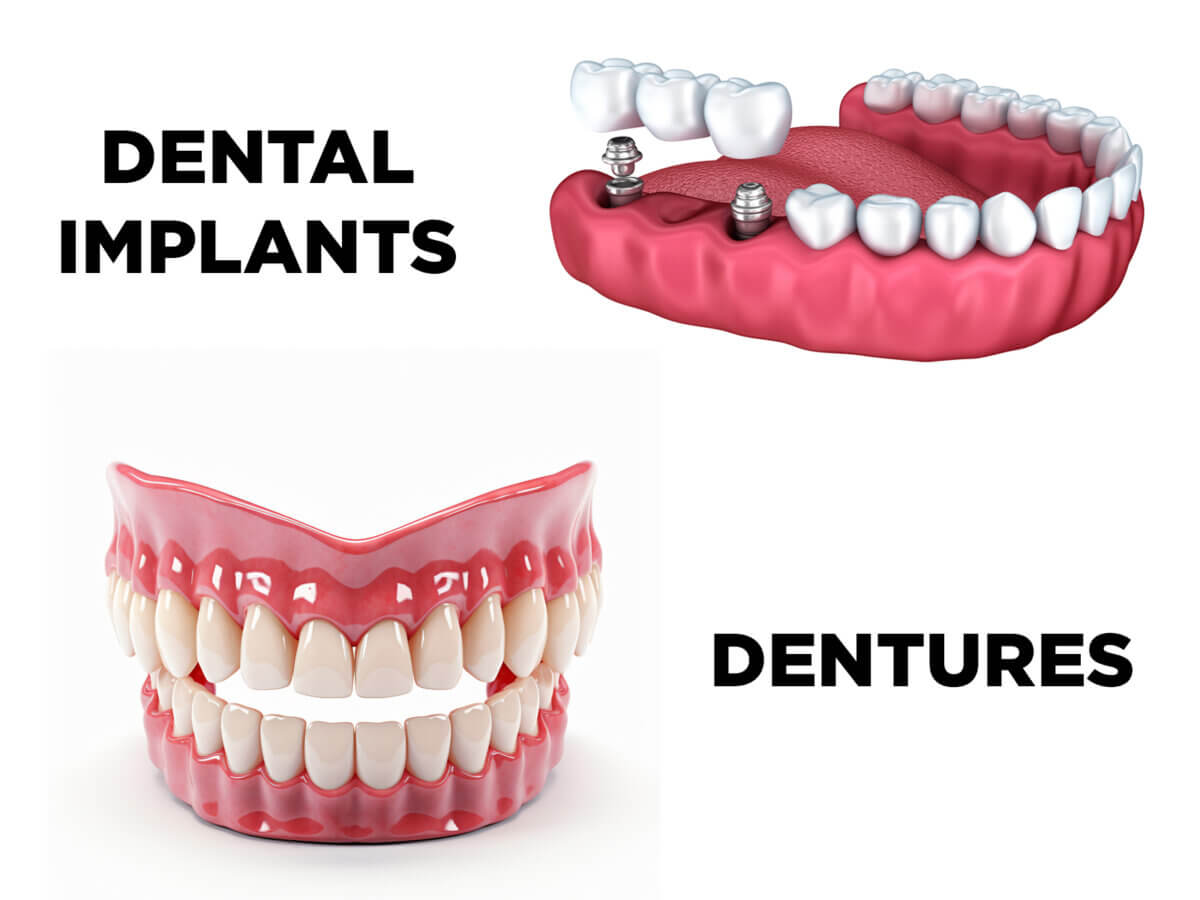Are you grappling with the decision of whether to opt for dentures or dental implants? This is a common plight for many, especially as they age and dental challenges become more frequent. Both dentures and dental implants have their advantages and disadvantages, and the right choice hinges on your specific situation and needs. In this article, we’ll delineate the distinctions between dentures and dental implants, aiding you in making an informed decision.
Understanding Dentures
Dentures are removable prosthetic teeth and gums crafted to replace absent natural teeth. They are primarily of two types: full dentures and partial dentures.
Full Dentures:
- Replace all the teeth in either the upper or lower arch.
- Sit on the gums and are secured with adhesive or suction.
Partial Dentures:
- Employed when some natural teeth remain.
- Attach to the existing teeth using metal or plastic clasps.
The Pros of Dentures
- Affordability: Dentures are generally more cost-effective upfront compared to dental implants.
- Non-Invasive: Dentures don’t necessitate surgery, making them a less daunting choice for some.
- Easy Maintenance: Dentures are relatively simple to clean, and if damaged, repairs are feasible.
The Cons of Dentures
- Stability: Dentures can shift or become dislodged during activities like eating or speaking, causing discomfort or potentially awkward moments.
- Bone Loss: Prolonged use of dentures can lead to bone loss in the jaw, resulting in facial structural changes and fit challenges.
- Limited Functionality: Certain foods might be difficult to chew, and speech might initially be impacted.
- Understanding Dental Implants
Dental implants are biocompatible titanium structures that replace tooth roots. They are surgically embedded into the jawbone to anchor a replacement tooth or bridge.
The Pros of Dental Implants
- Stability: Implants offer a stable and secure foundation for replacement teeth. They remain stationary during activities like eating or speaking.
- Longevity: With appropriate care, dental implants can endure a lifetime, rendering them a long-term and cost-effective solution.
- Preserve Bone Health: Implants stimulate the jawbone, averting bone loss and preserving facial contours.
- Natural Look and Feel: Implants emulate the appearance and function of natural teeth, facilitating normal eating and speaking.
The Cons of Dental Implants
- Cost: Upfront, dental implants tend to be pricier than dentures, though their durability might render them more cost-effective in the long haul.
- Surgery: The implant process necessitates surgery and a subsequent healing phase before the final prosthetic can be affixed.
- Not Suitable for Everyone: Due to factors like inadequate bone density or other health concerns, some individuals might not be ideal candidates.
Choosing the Right Option for You: Dentures vs. Dental Implants
Your choice between dentures and dental implants should be influenced by:
- Budget: If immediate cost is a primary concern, dentures might be more appealing—however, factor in long-term expenses, including upkeep and potential replacements.
- Health: Your overall health and the state of your jawbone are pivotal in determining your suitability for dental implants.
- Lifestyle: Reflect on how each alternative would affect daily activities, such as eating, speaking, and socializing.
- Longevity: If you’re seeking a durable solution and are prepared for a higher initial investment, dental implants might be more fitting.
- Aesthetics: If a natural appearance and sensation are paramount, dental implants might be more aligned with your expectations.
- Maintenance: Dentures demand regular cleaning and occasional tweaks or replacements, whereas dental implants require minimal upkeep.
Conclusion
The decision between dentures and dental implants is deeply personal and hinges on individual needs and preferences. It’s imperative to engage with a seasoned dentist who can evaluate your oral health and guide you toward the most apt solution.
Both dentures and dental implants have their virtues. While dentures might be a more immediate and budget-friendly option, dental implants offer unparalleled stability and longevity.




